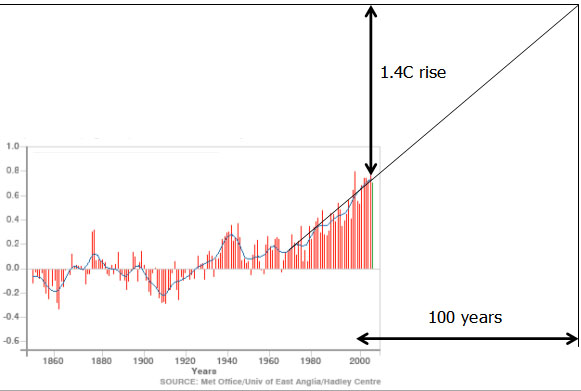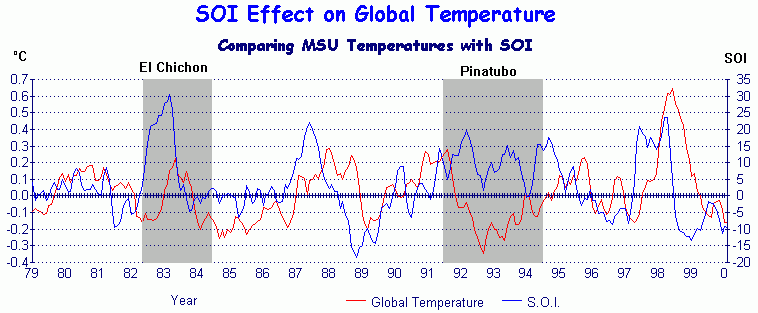
www.benlovejoy.com
| Global warming |

| Let's begin by drawing a distinction that often gets lost in media coverage of the subject ... Global warming is the established fact that the planet is getting warmer. Man-made global warming is the theory that man's activities are responsible for the planet getting warmer. The two are often treated as if they were a single claim. Let's begin by looking at the fact of global warming ... The scale of global warming: separating fact from hysteria There are almost as many estimates of the rate of warming as there are proponents of the theory. If we're to have a sensible debate about the matter, our first task is to find an estimate from an authoritative source. I started with the BBC website, which cites the Met Office as its own authoritative source, so I shall do the same. Let's see what the Met Office records as the rate of global warming since 1850 (when reliable temperature records began):
The scales chosen for the graph make the running mean look quite steep, but let's look at what is being shown here. In the 156 years since reliable records began, the increase in the global average near-surface temperature is ... 0.7C. Ok, you say, but that's an average over a long period. What we're interested in, surely, is the current rate in our industrialised world, with all those millions of cars and plane journeys? Obviously the industrialised nations are not going to keep adding cars and planes at the same rate, but the developing nations will join in, so if indeed global warming is man-made (a claim we shall examine in a minute), it's fair to expect the trend to continue. Now, this is all going to be rather crude, based on physical measurements of the above graph, but it will be close enough to make the general point. Let's measure some scales on the graph:
Now let's extrapolate 100 years, and measure the temperature increase predicted by extrapolating from the very steepest part of the graph: |

|
Now, we all accept the butterfly wings concept - that even small changes can have unpredictably large effects - but this is a rather different picture from the hysterical predictions made by some of the more extreme 'environmental groups'. I'll explain later in this article why I put 'environmental groups' in inverted commas ... Oh, and if you want to see the quality of some of the data-collection that goes on for the temperature sensors, take a look at this webpage and the absolutely astonishing mess at the CRU, a key provider of data and modelling to the IPCC. When some of their modelling was challenged, and they were asked to produce the source data, they claimed it had been lost - and this text file shows how they set about trying to, uh, recreate it ... The causes of global warming Not even the most apocalyptic scientist would dream of claiming that man's impact on global warming (if it exists at all) is the only cause of global warming. There are two key known natural causes: naturally-occuring meteorological phenomenon, and solar activity. Meterological phenomenon The best-known of these is El Nino - or, to give it its full name, the El Nino Southern Oscillation (ENSO). The Met Office describes ENSO as "the largest influence on the year-to-year variability of the Earth's climate" - a claim which is easily demonstrated, as we'll see in a moment. El Nino is the Spanish for "little boy", a reference to the birth of Jesus, because it is typically first felt around Christmas. Indeed, based on the strength of the current ENSO, the Met Office is already predicting that 2007 will set new temperature records in the summer. The strength of ENSO is measured by the Southern Oscillation Index (SOI). The theory says that there will be a strong correlation between SOI and mean surface temperatures, with temperature changes lagging approximately six months behind the SOI. So let's look at some NASA data and see how the theory pans out: |

|
While there is some deviance during the Pinatubo El Nino, I think it is pretty clear that the Met Office is correct in its assertion. Now, some so-called 'environmentalists' like to give the impression that El Nino is yet more evidence of man-made climate change, so I think I ought to knock that one on the head before we go any further. The earliest recorded description of the phenomenon by the name El Nino was by Captain Camilo Carrilo at a Geographical Society conference in Lima in 1892. The phenomenon itself predates the naming by some margin. NASA reports that major ENSO events occured in 1790-93, 1828, 1876-78 and 1891. The BBC guide to El Nino reports archeological evidence suggesting that the phenomenon has been around for about 15,000 years. All-in-all, it appears fairly safe to conclude that El Nino isn't caused by mums doing the school run in their 4x4s. Solar activity Imagine the strident tones of 'environmental groups' if the Earth's temperature were to increase not by 0.7C or 1.4C in 100 years, but by between 3C and 5C in just 20 years! They would want planes grounded, cars banned, hairspray production stopped ... Well, NASA reports that gas-content measurements of the Greenland ice cores show that exactly that rate of increase occured. Approximately 200,000 years ago. So, uh, probably not due to me doing a few extra laps of the Nurburgring, then ... The most convincing explanation for long-term climate change is found in solar activity. The sun's energy output varies over time in what are known as solar activity cycles. The average length of these cycles is 11 years, but they vary from around 9.5 years to around 12 years. I couldn't find any Met Office data, so I went to the closest source I could find: the Danish Meteorological Institute. The solar cycle theory of global warming predicts that there will be a strong correlation between the average values of the Northern Hemisphere Land Temperature (shown on the graphs below as T) and the length of the solar cycle (shown as L). So, let's see how well the theory stacks up:
Looks pretty good to me. In fact, it looks like a better match than any of the predictions made based on man-made global warming theories. If you want to go further back in time, estimating temperature from tree-ring analyses and solar activity from observations of auroral displays, the correlations look equally good:
As the pattern can be seen as early as 1575, I would suggest that we can probably rule out the impact of too many chavs making no-frills flights to Malaga. Man-made global warming When you look at the twin impacts of solar cycles explaining long-term temperature changes, and naturally-occuring meteorological phenomenon like El Nino explaining shorter-term ones, there isn't really much left to explain about why we're experiencing global warming. There are two main objections to the theory of man-made global warming. First, none of the models have proven very successful at prediction - at least, until they start adding 'correction factors' after the event (I wish Camelot would allow me the same leeway in adding post-result 'correction factors' to my lottery numbers). Indeed, most of the predictions have proven less successful than a random number generator. Second, even if human activity does make some kind of contribution to global warming, it is clear that the effects are dwarfed by naturally-occuring phenomenon. If indeed we are headed for global disaster in 2000 years time, it won't have much to do with our puny little contribution to climate change. Indeed, the man known as the father of scientific climatology, UW-Madison Professor Emeritus Reid Bryson has this to say about the human contribution to global warming: "It's like there is an elephant charging in and you worry about the fact that there is a fly sitting on its head. It's just a total misplacement of emphasis. It really isn't science because there's no really good scientific evidence." We are talking about spending trillions of pounds, and causing massive disruption to the way in which we live our lives, to achieve the climatological equivalent of rearranging the deck-chairs on the Titanic. Why do I refer to 'so-called environmentalists'? An environmentalist is someone who cares about the quality of our environment. I am an environmentalist, though the word has been so successfully hijacked that I would never describe myself as such outside of the context of this article. The reality of most of the so-called environmentalist groups is that their agenda has nothing to do with climate change. Organisations like Friends of the Earth and Greenpeace are today mostly packed with members whose real objection is to capitalism and a materialist lifestyle. They would like us to return to some mythical Golden Age of simple living. Patrick Moore was a co-founder of Greenpeace. Here is what he has to say about the organisation today: "There were always extreme, irrational and mystical elements within our movement, but they tended to be kept in their place during the early years. Then in the mid-Eighties, the ultraleftists and extremists took over. After Greenham Common closed and the Berlin Wall came down, these extremists were searching for a new cause and found it in environmentalism. The old agendas of class struggle and anti-corporatism are still there, but now they are dressed up in environmental terminology." If you want to conduct an enlightening experiment, go and talk to a FOE or Greenpeace activist, give the impression of being sympathetic and then listen to the things they will be telling you within 20-30 minutes. So next time the government tells us it is introducing yet another motoring tax for the good of the planet, a campaign group tries to make us feel guilty for enjoying a long weekend in Prague, or an 'environmentalist' tries to convince us that we are morally derelict for daring to own a car, we might want to challenge them to deal with a few 'uncomfortable truths' of their own. |
| www.benlovejoy.com | Global warming |
Copyright © Ben Lovejoy 2007-9 | Email me | Bookmark
this site |